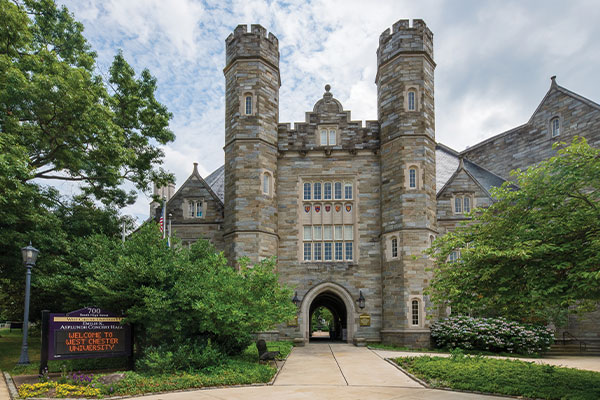
UNIVERSITY NEWS
Library Mounts Exhibition
from Special Collections:
“A BOTANICAL BLUEPRINT: SUSTAINABLE ROOTS & ENVIRONMENTALISM AT WEST CHESTER”
The backbone of and inspiration for the Francis Harvey Green Library’s current exhibit of “A Botanical Blueprint: Sustainable Roots & Environmentalism at West Chester University” is WCU’s Darlington Herbarium. The exhibition showcases historical botanical specimens, rare books, photographs, and ephemera that explore how environmentalism and sustainability were part of the University’s past, and continue to weave through the University’s story. It is on display on the sixth floor of FHG Library now until early 2025.
Long before the internet and phone apps that help users identify wildflowers and other plants in situ, Pennsylvania’s colonial inhabitants collected and dried plant specimens. Individuals corresponded with other contemporary naturalists to exchange ideas as well as plants. West Chester native William Darlington (1782-1863), a physician, U.S. Congressman, botanist, and one of the founders of the West Chester Academy (the early 18th-century precursor to WCU), was one such collector who became renowned for his thoroughness.
Peoples’ understanding of sustainability and being good environmental stewards have grown and evolved, and this exhibition seeks to highlight some of the ways that has happened at WCU.
West Chester University is the repository for Darlington’s Herbarium, a collection of more than 20,000 plant specimens and one of the oldest such institutional collections in the United States. Originally held by the Academy of Natural Sciences in Philadelphia, the herbarium, along with Darlington’s writings, was donated to West Chester State Teachers College in the 1870s.
Jenna Falkenberg, Special Collections technician and curator for the exhibition, said the display explores the evolution of environmentalism and sustainability at WCU. “Against the backdrop of global movements, it examines the local study of natural history that emerged in the 18th century, showcases historical artifacts from the William Darlington Herbarium and other collections, and traces the rise of WCU’s current focus on sustainability.
“I've connected the botanical past with our University, as plant collecting (for herbaria) set the stage for future generations to get involved in environmental causes like land conservation and wildlife habitat preservation. And as evidenced through photos and our archive, our faculty, staff, and students have studied natural history and practiced environmental advocacy, too.”
Falkenberg says the herbarium was used carefully in classes through the middle of 20th century since “the faculty and administration felt it was important and appropriate to get all students engaged in the sciences.”
In the summer of 2021, WCU partnered with Morris Arboretum and Gardens, which lent Falkenberg the equipment for digitizing the collection and transcriptions of Darlington’s letters.
“The more I learned about the region’s past engaging with natural history, the more I started to make the connection that the work of Darlington and others who dabbled in botany and natural history served as a blueprint for WCU’s focus on sustainability and environmentalism,” she explains. “Students directly engaged with the herbarium in coursework throughout the 1900s and participated in biology and environmental education courses. Students proposed the Gordon Natural Area (GNA) to the University’s administration during the 1960s. This all relates to where we are today.
“While not as many people are collecting plants in the field anymore, peoples’ understanding of sustainability and being good environmental stewards have grown and evolved, and this exhibition seeks to highlight some of the ways that has happened at WCU.”
The Darlington Herbarium exists online through the Mid-Atlantic Herbaria Consortia.
Credits for the exhibition also go to Ron McColl, assistant professor, Special Collections librarian, and curator of the herbarium, which was previously housed in WCU’s biology department. He is exhibition editor while Bridget Voltz, library communication technician, is exhibition designer.
Guests are welcome to view the exhibition during regular library hours.
More from the Summer 2024 Issue
News
Sustainable Roots
WCU's commitment to environmentalism
GNA Forest Fest Wins
Governor’s Award for Environmental Excellence
Mellon Foundation
Funds Women’s and Gender Studies Collection
Profiles
Donor:
Aurelio Peter Ojeda ’80
Alumni:
Evelyn Anderson ’08, M’09, M’17, D’23
Faculty:
Devin Arne
Student:
Alexander Conzaman




